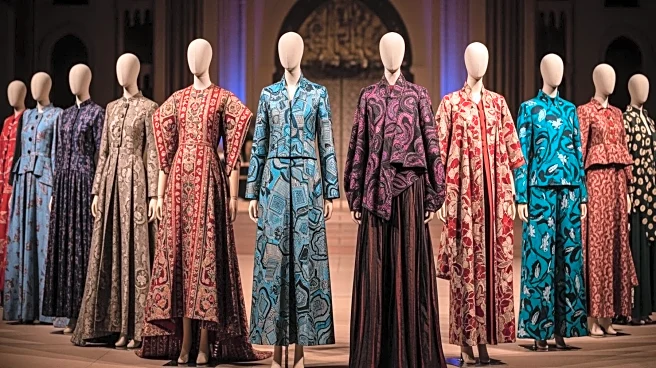What's Happening?
Vivienne Westwood's granddaughter, Cora Corré, has publicly criticized the fashion house's decision to participate in Riyadh Fashion Week, citing a misalignment with the values of the late designer. Despite
Saudi Arabia's controversial human rights record, the brand has defended its participation as a means to foster dialogue and cultural exchange. The announcement coincides with the Vivienne Foundation's launch of a T-shirt range, with proceeds supporting LGBTQ+ charities. Human Rights Watch has condemned Saudi Arabia's human rights practices, highlighting the country's use of wealth to influence global culture and sports. Amnesty International has urged public figures to spotlight the challenges faced by LGBTQ+ individuals in Saudi Arabia, where same-sex relations are criminalized.
Why It's Important?
The participation of Vivienne Westwood in Riyadh Fashion Week raises significant ethical questions about the role of fashion in global politics and human rights advocacy. The decision has sparked debate over whether cultural engagement can effectively promote dialogue or inadvertently endorse regimes with poor human rights records. The fashion industry's involvement in such events may impact its reputation and influence public perception of its commitment to social justice. Stakeholders, including activists and consumers, may pressure brands to reconsider their participation in events hosted by countries with controversial policies, potentially affecting business strategies and market dynamics.
What's Next?
The controversy surrounding Vivienne Westwood's participation in Riyadh Fashion Week may lead to increased scrutiny of fashion brands' involvement in events hosted by countries with questionable human rights records. Stakeholders, including human rights organizations and consumers, may demand greater transparency and accountability from brands regarding their ethical stances. The fashion industry might face calls to prioritize social responsibility over commercial interests, influencing future decisions on event participation and collaborations. Additionally, the Vivienne Foundation's T-shirt campaign could gain traction, drawing attention to the causes it supports and prompting other brands to adopt similar initiatives.
Beyond the Headlines
The situation highlights the complex interplay between fashion, politics, and ethics, underscoring the industry's potential to influence societal norms and values. As fashion brands navigate global markets, they must balance commercial objectives with ethical considerations, potentially reshaping industry standards. The controversy may prompt broader discussions on the role of cultural events in promoting human rights and the responsibilities of public figures in advocating for marginalized communities. Long-term, this could lead to a shift in how brands engage with international markets, prioritizing ethical partnerships and advocacy over mere commercial gain.









